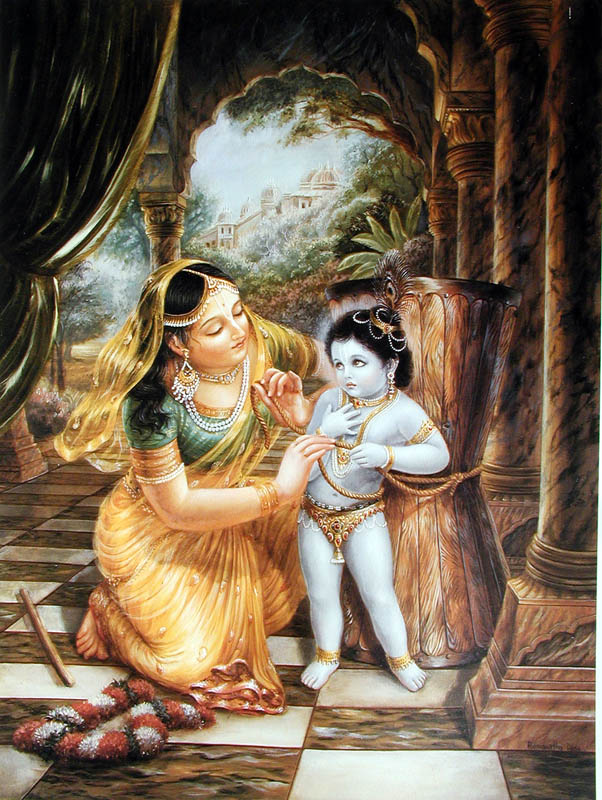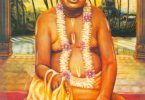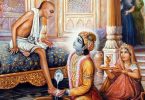The Mouse, the Lamp and the Queen
A Puranic History
Srila Jiva Goswami writes in Bhakti-sandarbha, anuccheda 153:
astu tāvat śuddha-bhakty-ābhāsasya vārtā, aparādhatvena
dṛśyamāno ‘py asau mahā-prabhāvo dṛśyate.
It is seen that the activities of pure bhakti when performed even without a devotional attitude are still very powerful.
Srila Jiva Goswami then cites an example from the Viṣṇudharmottara Purāṇa of an ordinary mouse who became a devotee and a queen due to some superficial contact with the Lord. A similar story is also found the Padma Purāṇa.
In the Viṣṇudharmottara (1.167), Markandeya Rishi relates the following to King Vajra.
In the country of Vidarbha there lived a king named Chitraratha. He had one hundred and fifteen sons, but only one daughter, whose name was Lalitika. She was endowed with all good qualities and possessed matchless beauty. Her father gave her in marriage to the righteous king of Kashi. That law-abiding king of Kashi had three hundred wives, but Lalitika became his principal queen. Beginning from the dark half of the month of Āśvina (September- October), till the bright half of the month of Kārttika (October-November), it was Lalitika’s daily practice to light thousands of lamps, both day and night, in the temple of Vishnu. She also sent lamps to the houses of Brahmins, to crossroads of the streets, to various temples, at the bottom of holy trees, on the tops of mountains, on the sandy banks of rivers, and on the surface of wells. Seeing her thus absorbed, her co-wives gathered together and asked her, “O fair eyed Lalitika! Neglecting all other rituals, you always seem keen on lighting lamps in the temples of Vishnu. We are very curious to know why you do this. Please explain to us why you have so much faith in this activity?”
Lalitika replied, “O auspicious ladies! Listen carefully to my words, and I will tell you why it is that I have faith in the fruit of giving lamps. That worthy daughter of the lord of mountains, who is the beloved wife of Shiva, is famous in the country of Madra in her form of the divine river named Umadevi. For blessing the masses of people, she was called by the Brahmins to descend to the earth. On her banks there is a sacred place measuring eight miles in circumference. The water in that holy place is considered to contain waters from all the places of pilgrimage. Whoever dies there obtains an auspicious result. That goddess destroys sins whenever she is heard, wished for, or seen. Her holy place, named “Narasimha”, destroys all sins. In the past, the Lord who has a combined form of a man and a lion had taken a bath there. In ancient times, the king of Sauvira constructed a temple of Lord Vishnu at that place. The priest there daily worshiped the Lord with flowers, fragrant scents, and the offering of lamps. One evening during the month of Kārttika, the lamp that had been offered to the Lord was almost extinguished. I was then living in that temple in the body of a female mouse. Thinking to eat the ghee-soaked wick, I seized it, but suddenly a cat came. I fled away out of fear with the wick in my mouth. My running made the flame of the lamp burn brightly as before. I then met with death and was later reborn as a daughter of the king of Vidarbha.”
In the Padma Purāṇa story (Uttara-khanda, chapter 30), Lord Shiva relates the following to Narada Muni. On the charming bank of the Saraswati River there was a hermitage known as Siddhashram. Formerly a Brahmin named Kapila lived there. He was poor but learned in the Vedas, and maintained his family by begging. He worshiped Lord Vishnu by performing various vows and fasts. As part of his worship of the Lord, with great devotion he always lit lamps in his house for the pleasure of Vishnu.
A cat with sharp teeth was also living in the house. Day and night, the cat was searching for mice, and ate many in the house of the Brahmin Kapila. One Ekādaśī day, that pure Brahmin and his wife fasted and worshiped Vishnu.
Singing and praying to the Lord and dancing in front of his deity, Kapila stayed awake. When it was midnight, the Brahmin was finally overcome with sleep. Seeing that Kapila had fallen into a slumber, the cat quickly came there. He saw a small female mouse that had come to eat the wick and drink the oil in the lamp. He jumped and attacked, and the mouse ran away. While running away, the mouse bumped the lamp with its foot. Due to that contact, the lamp suddenly became bright. With the suddenly increased light of the lamp, the Brahmin woke up and continued his all-night vigil. The cat also stayed awake throughout that night. When the sun rose, the Brahmin performed his daily duties and then broke the fast along with his relatives.
The magnanimous Brahmin Kapila obtained many sons and grandsons, as well as grains, excellent health, and abundant riches. Finally, at the end of his life, Kapila was liberated from this material world due to his practice of offering lamps to the Lord.
In course of time, the female mouse also died and a wonderful divine airplane came and took her to the world of Vishnu. The cat also eventually met with death, and, ascending an excellent airplane surrounded by celestial nymphs, accompanied by hosts of Vidyadharas, and being praised with auspicious cries of victory, he also went to the world of Vishnu. After enjoying many pleasures there for hundreds of millions of years, that former cat took birth on the earth as a king named Sudharman. [In this connection, see “Prapanchika Vaikuntha”, in the box below.]
Maharaja Sudharman was religious-minded. He regularly worshiped the Lord and the Brahmins, and he was handsome, brave, and very strong. His dear wife was endowed with all auspicious marks, devoted to her husband, and was of good character. Her name was Rupasundari, and she was the most beautiful among all ladies. Many sons and daughters were born to them. While the couple was thus enjoying each other’s company, the month of Kārttika arrived. During that month, lamps are lit by those who are devoted to Vishnu.
One day, the king said to the queen, “Today is the auspicious Prabodhini Ekādaśī [also known as Haribodhini or Utthānā Ekādaśī, it is the last Ekādaśī of the Vaishnava month of Kārttika and marks the end of Lord Vishnu’s four-month slumber known as cātur-māsya]. With my senses controlled by fasting, today I will bathe in the holy place Pushkar and worship the imperishable lotus-eyed Lord of gods along with his consort Lakshmi.”
Hearing these pleasing words, Rupasundari, who was always engaged in the well-being of her husband, replied, “O king, I desire to go with you to the sacred place Pushkara.”
Then the king and queen, accompanied by groups of elephants, horses, chariots, and the family-priests, came to Pushkar. The king took bath and worshiped the Supreme Lord Vishnu. Standing in a charming temple that was full of rows of lights everywhere, the king suddenly saw a drawing of a cat. Upon seeing that picture, the king remembered his former existence, looked at the lotus-like face of his beloved, and smiled.
Rupasundari said, “O lord, why did you smile after looking at me?”
The king replied, “In a previous birth I was a cat in the house of a Brahmin. There I ate hundreds of mice. Even though my intention was to catch mice to eat, since the result was that I guarded the lamp in front of Vishnu, I got, O Queen, the fruit of that deed. I first attained the world of Vishnu and now have obtained a kingdom here on earth.
Rupasundari said, “I, too, have gained recollection of my former existence. I was a small female mouse in the house of the Brahmin. Once, on the Prabodhini Ekādaśī in Kārttika, when the lamp had become dim, I came out of my hole to snatch the wick so I could eat it. Emerging from the hole, I saw the deity of Vishnu decorated with flowers and the Brahmin overcome with sleep. You, in the body of a cat, jumped up to attack me. I saw you and ran back into the hole. In doing this, my foot struck the lamp and it made the wick suddenly burn bright. O lord of great kings, since I brightened the lamp in that way, I have now secured excellent beauty, obtained you as my husband, and also gained a kingdom, sons, and great happiness. Due to my inadvertent brightening of the lamp, I secured the fruit of even unconsciously assisting offering a lamp to Vishnu, we have been blessed to remember our former existences and all our sins have perished.”
After this discussion, the king and queen, with great faith, properly performed the rituals of offering a lamp to Vishnu at the holy place of Pushkar. As a result, the two of them obtained salvation, which is difficult for even the demigods to attain.
Thus, bhakti is so powerful that even the slightest touch of it possesses great power. As Krishna says in Bhagavad-gītā 2.40:
nehābhikrama-nāśo ‘sti pratyavāyo na vidyate
sv-alpam apy asya dharmasya trāyate mahato bhayāt
“In this endeavor there is no loss or diminution, and a little advancement on this path can protect one from the most dangerous type of fear.”
— MD.
Bibliography
— Bhagavad-gītā As It Is. English translation and commentary by A.C. Bhaktivedanta Swami Prabhupada. Bhaktivedanta Book Trust. Bombay. 1995.
— Jiva Goswami. Śrī Bhakti-sandarbha. English translation by Sri Kusakratha Das. The Krishna Institute. Culver City, California.
— Jiva Goswami. Śrī Bhakti-sandarbha. Gaudiya Mission. Kolkata. 2005. Sanskrit in Bengali script.
— Padma Purāṇa. English translation. Motilal Banarshidass. Delhi. 1990.
— Vishnudharmottara Purana, with English translation by Dr. Priyabala Shah. Parimal Publications. Delhi. 2005.







